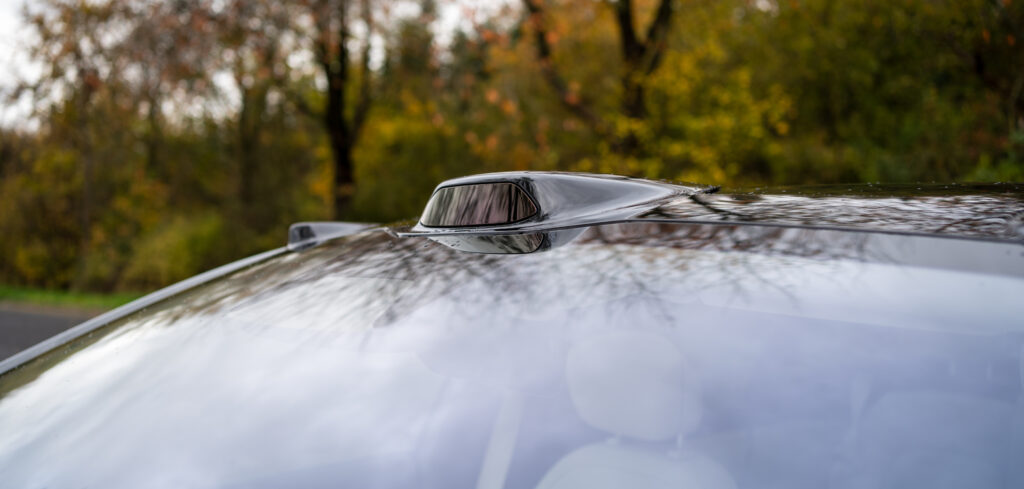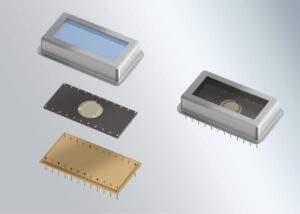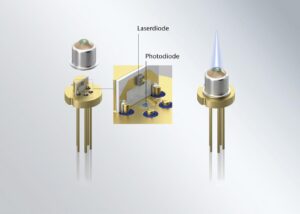High-performance sensor packaging is crucial in high-level advanced driver assistance systems (ADAS). Hermetic sensor packaging using glass-to-metal sealing (GTMS) technology delivers exceptional robustness and empowers sensors with outstanding technical performance, according to Elisabeth Fey, head of strategic marketing, Schott AG.
Safety is the name of the game for assisted and fully autonomous driving
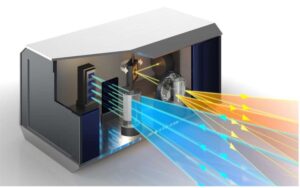
Lidar, or light detection and ranging, is one of the most important technologies enabling autonomous driving. While significant strides have been made in developing consistently safe and reliable autonomous driving systems, there are still some issues to be conquered. One is the quality of optical signal transmission in lidar systems. The challenge lies in the fact that lidar sensors must be extremely precise but are primarily installed on the outside of vehicles. This leaves them exposed to harsh conditions such as extreme temperature, high humidity and UV rays as well as increased shock and vibration. These hazards could damage or even destroy the sensitive inner components of the system, including laser diodes, MEMS mirrors and signal-receiving photodiodes.
Moisture intrusion is what many developers fear most. If a water droplet ends up on critical and sensitive components like laser emitters, lenses or galvo mirrors, it could cause significant performance reduction, a blind spot or even catastrophic failure of the sensor. In a self-driving car, this could lead to incorrect operation and even traffic accidents – both life-threatening safety risks.
High-quality packaging components are essential for accurate optical signals
The harsh conditions experienced in driving environments combined with extreme optical performance requirements mean that sensitive lidar components need robust, vacuum-tight packaging. Furthermore, to establish lidar technology in mass-market automotive applications, absolute safety, reliability and durability are crucial. Packages for lidar sensors must enable stable, high-performance optical signal transmission – not just for a few hours or days but consistently over many years.
Selecting the right packaging technology is critical for automotive applications
When it comes to hermetic sensor packaging, there are different types of technologies available. One of the most common, highest-performing technologies for harsh-environment automotive and optoelectronic sensor packaging is glass-to-metal sealing, abbreviated as GTMS. Hermetic packaging using GTMS technology fully encapsulates the sensor components in inorganic materials. Metal housing components are combined with electrical conductors utilizing technical glasses and metal brazes to provide an impermeable and virtually non-aging enclosure around a component or entire sensor. Gas and moisture cannot penetrate the glass seal, which maintains high hermeticity levels on a near-permanent basis. In comparison, non-hermetic sealing materials, such as polymers, age naturally over time and cannot maintain a truly hermetic environment.
Using glass-to-metal sealing technology, optical windows can be added to provide an optical path through the walls of the sensor. Varieties of high-quality glass windows are available to provide the best transmission for your material combination and wavelength. Band-pass and high-pass filter coatings minimize optical noise to increase your signal-to-noise ratio.
Glass-to-metal seals deliver exceptional robustness
An important consideration for glass-to-metal seals is selecting the right combination of specialty glass and metal. It is key that the two materials have appropriate coefficients of thermal expansion (CTE) because glass and metal typically expand or shrink differently during the sealing process. A carefully selected combination also enables the materials to be bonded together directly without any additional interface materials. Once melted together, the resulting glass and metal package can durably withstand even the most extreme pressures and temperature variations experienced by automobiles.
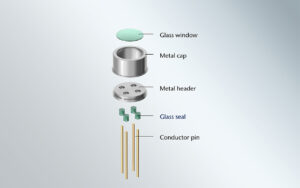
The typical pin design of a GTMS package – also referred to as a through-hole design – allows the sensor package to be tightly connected to a printed circuit board (PCB). The electrical contact pins can be inserted into and tightly fixed to the PCB using solder, which makes the assembly highly shock and vibration resistant. In addition, GTMS packages can be designed in a surface mount device (SMD) style.
This style provides short pins that can be used for pick-and-place assembly with industry-standard circuit board assembly techniques.
The right packaging partner can support your entire development journey
In this newly emerging field, several lidar sensor technologies are currently in the race. These include rotating sensors, MEMS scanners, semiconductor arrays and photonic systems. Although lidar sensor packaging requirements differ across technologies and customers, companies producing lidar systems all need a partner that understands high-reliability electronic packaging, has advanced capabilities, and is experienced in automotive methods. This trusted partner must be capable of supporting each development step – from research and prototyping all the way to volume production – with consistently high quality.
“Schott is ready to serve fast-growing lidar technology with a collaborative approach, high quality, and custom-designed as well as standard packaging products,” says Schott’s lidar application expert, Kristina Gruber. “Based on decades of expertise as a supplier to the telecom/datacom and automotive industries, customers benefit both from our optoelectronic know-how as well as our high-volume manufacturing capabilities, including worldwide IATF 16949 certified production sites.”


